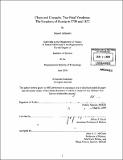| dc.contributor.advisor | Jeffrey S. Ravel. | en_US |
| dc.contributor.author | Hollander, Samuel, S.B. Massachusetts Institute of Technology | en_US |
| dc.contributor.other | Massachusetts Institute of Technology. School of Humanities, Arts, and Social Sciences. History Section. | en_US |
| dc.date.accessioned | 2009-12-10T19:13:13Z | |
| dc.date.available | 2009-12-10T19:13:13Z | |
| dc.date.copyright | 2009 | en_US |
| dc.date.issued | 2009 | en_US |
| dc.identifier.uri | http://hdl.handle.net/1721.1/50105 | |
| dc.description | Thesis (S.B.)--Massachusetts Institute of Technology, Dept. of Humanities, 2009. | en_US |
| dc.description | Includes bibliographical references (leaves 97-98). | en_US |
| dc.description.abstract | Introduction: There were two invasions of Russia by foreign powers in the early eighteenth and nineteenth centuries. Charles XII of Sweden entered Russia in 1708 and was destroyed in battle outside Poltava in 1709. Napoleon invaded in 1812 and was back in France before the end of that year, having suffered defeat and having lost all but a few remnants of the once-proud Grand Army. Both of these men were at the height of their power and feared by their enemies up to the time of their attacks against Russia. However, the Duke of Wellington understood the way of conquerors and commented on their fate. "A conqueror is like a cannon-ball. He cannot stop of his own accord. He must go on until he runs down or hits something." These men captured the imagination of their European contemporaries. Voltaire would later describe this attention: Conquerors are a species between good Kings and Tyrants, but partake most of the latter, and have a glaring reputation. We are eager to know the most minute circumstances of their lives. Such is the ... weakness of mankind, that they look with admiration upon persons glorious for mischief, and are better pleased to be talking of the destroyer, than the founder of an Empire. Charles XII and Napoleon were both the preeminent generals of their age. But unlike the French emperor, Charles is a relatively unknown figure today. He was the last of the Northern Vikings, the last Nordic warrior king to lead his men into battle, and a halo still surrounds his memory. Never was a man more thoroughly suited to inspire Swedish troops than Charles XII. Noble, just, self-denying, and brave, he seemed to them almost a supernatural being. Every victory he won made his soldiers more confident in him. Every danger he shared with them spurred them on to further exertions. Every age has its own heroes, men who embody the prevailing characteristics of their epoch. Charles was that man while he lived at the start of the eighteenth century. The very mention of his name and exploits still causes the heart of every Swede to beat quicker. It is a name renowned throughout his world, and associated with a career so extraordinary, that both the man and the career have formed a subject of greatly varied criticism. Perhaps his great descendant, King Gustavus III, summed up the life of Charles most accurately: Charles XII was rather extraordinary than great. He certainly had not the true conquering temperament which simply aims at acquisition of territory. Charles took dominions with one hand only to give them away with the other. Superior to Alexander, with whom it were [sic] an injustice to compare him, he was as much inferior to his rival Peter in the qualities which make a great ruler, as he excelled him in those qualities which go to make a great hero.4 Unfortunately for Sweden, Charles was also ideally placed in history to demonstrate the fragility of her empire; much as Napoleon would doom the French empire a hundred years later with his own ambitions. | en_US |
| dc.description.statementofresponsibility | by Samuel Hollander. | en_US |
| dc.format.extent | 98 leaves | en_US |
| dc.language.iso | eng | en_US |
| dc.publisher | Massachusetts Institute of Technology | en_US |
| dc.rights | M.I.T. theses are protected by
copyright. They may be viewed from this source for any purpose, but
reproduction or distribution in any format is prohibited without written
permission. See provided URL for inquiries about permission. | en_US |
| dc.rights.uri | http://dspace.mit.edu/handle/1721.1/7582 | en_US |
| dc.subject | Humanities, Arts, and Social Sciences. History Section. | en_US |
| dc.title | Chaos and Cossacks, two fatal vendettas : the invasions of Russia in 1708 and 1812 | en_US |
| dc.title.alternative | Chaos and Cossacks, 2 fatal vendettas : the invasions of Russia in 1708 and 1812 | en_US |
| dc.title.alternative | Invasions of Russia in 1708 and 1812 | en_US |
| dc.type | Thesis | en_US |
| dc.description.degree | S.B. | en_US |
| dc.contributor.department | Massachusetts Institute of Technology. History Section | en_US |
| dc.contributor.department | Massachusetts Institute of Technology. Department of Humanities | |
| dc.identifier.oclc | 463006934 | en_US |
